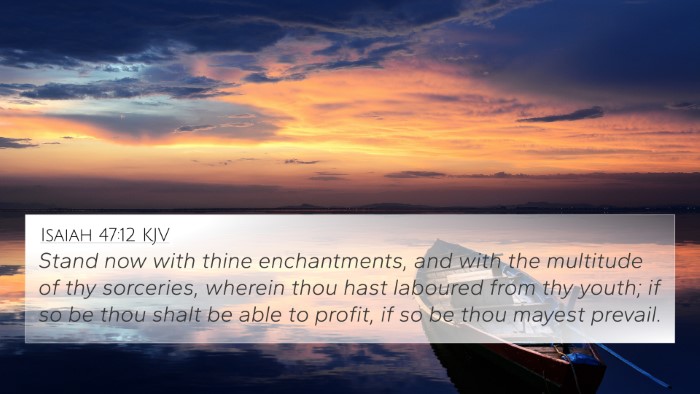Understanding Numbers 22:25
Numbers 22:25 recounts a significant moment in the narrative of Balaam and his interactions with his donkey. The verse states:
"And when the donkey saw the angel of the Lord, she laid down under Balaam: and Balaam's anger was kindled, and he smote the donkey with a staff." (Numbers 22:25)
Summary of the Verse
This verse illustrates a peculiar event where Balaam, a prophet, is seen in a confrontation with his donkey, which can speak through divine intervention. The donkey’s act of laying down signifies an inability or unwillingness to proceed due to the presence of an angel of the Lord. Balaam’s response is one of anger, showcasing his lack of understanding and insight into the spiritual reality surrounding him.
Insights from Commentaries
Matthew Henry's Commentary
Matthew Henry emphasizes the moral implications of Balaam's anger and how it reflects the broader theme of divine intervention in human affairs. Balaam's lack of perception dominates the narrative, highlighting how spiritual truths can often be overlooked by those consumed by their own agendas.
Albert Barnes' Notes on the Bible
Albert Barnes further explains the significance of the angel of the Lord’s presence. He notes that this encounter serves as a lesson on obedience and awareness of God’s will, showing that the animal’s insight is superior to Balaam’s understanding in that moment.
Adam Clarke's Commentary
Adam Clarke points out that the donkey symbolizes purity and obedience, contrasting Balaam’s disobedience and infatuation with gain. This act of the donkey laying down before the angel captures the theme of divine authority and the folly of humanity’s pride.
Interpretative Themes
- Divine Intervention: The angel’s presence is a powerful reminder of God’s control over the events of human life.
- Human Anger vs. Animal Obedience: Balaam’s frustration depicts the human tendency to react without understanding, while the donkey shows inherent wisdom.
- Spiritual Blindness: Balaam's inability to see the angel reflects a broader issue of spiritual blindness present in many narratives across Scripture.
- Obedience in Creation: The reaction of the donkey serves to highlight how even creation responds obediently to God’s will.
Cross-References
This verse resonates with several other passages in the Bible that delve into similar themes of divine communication, obedience, and human folly. Notable cross-references include:
- 2 Peter 2:15-16: This passage discusses Balaam as an example of greed and false prophets, linking back to this narrative.
- Deuteronomy 23:4: Reflects on Balaam's actions in light of Israel's history with him.
- Matthew 5:22: Illustrates the seriousness of anger, linking it to Balaam’s response to the donkey.
- 1 Corinthians 1:27: God often chooses the foolish things to confound the wise, as seen in the donkey’s perception.
- Proverbs 16:9: The heart of man plans his way, but the Lord establishes his steps, much like Balaam’s misguided journey.
- Jonah 1:17: A parallel in divine intervention, where God appoints resources for His purpose.
- Luke 19:40: Where the stones would cry out if the people did not praise God, exemplifying creation’s obedience.
Applications and Lessons
The lessons from Numbers 22:25 extend beyond the narrative and invite deeper reflection on our own spiritual lives:
- Awareness of God's Presence: It is vital to remain attentive to God’s interventions in our lives, as they may not always be apparent.
- Understanding Anger: The scripture reminds us to check our reactions and understand the underlying truths before responding.
- Learning from Creation: We can learn humility and obedience from the way the natural world responds to the divine.
- Value of Insight: Recognizing that wisdom can sometimes come from unexpected sources challenges our preconceptions.
Conclusion
Numbers 22:25 serves as a profound reminder of the themes of divine guidance and the folly of human pride and anger. By understanding this verse in light of its contextual and thematic connections throughout Scripture, we gain a greater appreciation for the overarching narrative of God’s sovereign authority.
In our Bible studies, utilizing tools for Bible cross-referencing can lead to richer insights and deeper understanding of how various Bible verses and stories connect thematically and morally.
Further Study Suggestions
For those interested in exploring similar themes, the following methods can enhance your study:
- Using a Bible Concordance: Equip yourself with a Bible reference resource to find related verses quickly.
- Engaging in Cross-Reference Bible Study: Explore connections between passages systematically.
- Participating in Comparative Bible Verse Analysis: Study how varied contexts can shed light on similar messages.
- Creating Thematic Bible Verse Connections: Compile verses that revolve around specific themes.




